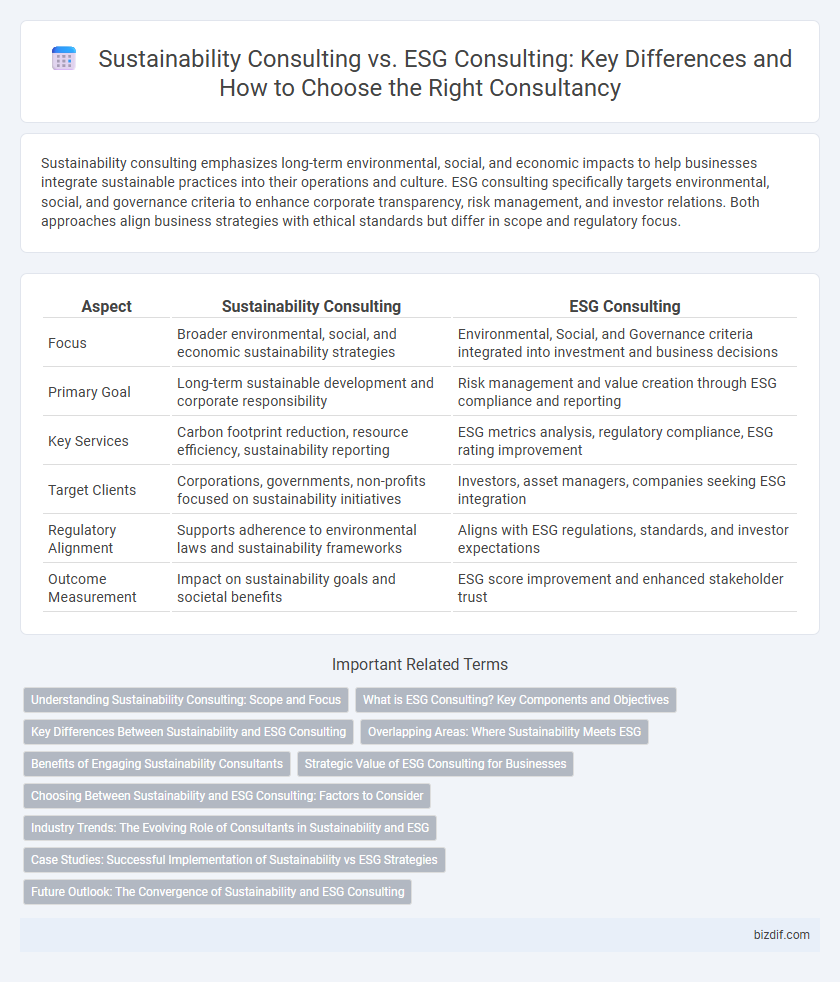Sustainability consulting emphasizes long-term environmental, social, and economic impacts to help businesses integrate sustainable practices into their operations and culture. ESG consulting specifically targets environmental, social, and governance criteria to enhance corporate transparency, risk management, and investor relations. Both approaches align business strategies with ethical standards but differ in scope and regulatory focus.
Table of Comparison
| Aspect | Sustainability Consulting | ESG Consulting |
|---|---|---|
| Focus | Broader environmental, social, and economic sustainability strategies | Environmental, Social, and Governance criteria integrated into investment and business decisions |
| Primary Goal | Long-term sustainable development and corporate responsibility | Risk management and value creation through ESG compliance and reporting |
| Key Services | Carbon footprint reduction, resource efficiency, sustainability reporting | ESG metrics analysis, regulatory compliance, ESG rating improvement |
| Target Clients | Corporations, governments, non-profits focused on sustainability initiatives | Investors, asset managers, companies seeking ESG integration |
| Regulatory Alignment | Supports adherence to environmental laws and sustainability frameworks | Aligns with ESG regulations, standards, and investor expectations |
| Outcome Measurement | Impact on sustainability goals and societal benefits | ESG score improvement and enhanced stakeholder trust |
Understanding Sustainability Consulting: Scope and Focus
Sustainability consulting primarily focuses on helping organizations integrate long-term environmental, social, and economic strategies into their core operations to drive sustainable growth. It involves assessing resource efficiency, stakeholder engagement, and sustainable supply chain management to reduce environmental impact and enhance corporate responsibility. This approach differs from ESG consulting, which emphasizes meeting specific regulatory criteria and reporting standards related to environmental, social, and governance performance metrics.
What is ESG Consulting? Key Components and Objectives
ESG consulting focuses on Environmental, Social, and Governance criteria to help organizations integrate sustainable practices into their core strategies, ensuring compliance with regulatory standards and enhancing long-term value. Key components include assessing carbon footprint, promoting social responsibility initiatives, and improving governance structures to mitigate risks and attract responsible investments. The primary objective is to support businesses in achieving transparent ESG disclosures, fostering stakeholder trust, and driving sustainable growth aligned with global sustainability frameworks.
Key Differences Between Sustainability and ESG Consulting
Sustainability consulting primarily focuses on long-term environmental stewardship, social responsibility, and economic viability to help organizations integrate sustainable practices into their core operations. ESG consulting emphasizes measuring and reporting Environmental, Social, and Governance criteria to meet investor demands, regulatory compliance, and risk management frameworks. Key differences lie in sustainability consulting's broader strategic approach versus ESG consulting's data-driven disclosure and compliance orientation.
Overlapping Areas: Where Sustainability Meets ESG
Sustainability consulting and ESG consulting both emphasize environmental impact, social responsibility, and corporate governance strategies to enhance business performance and stakeholder trust. Overlapping areas include carbon footprint reduction, resource efficiency, diversity and inclusion initiatives, and transparent reporting aligned with global standards such as GRI and SASB. Integrating these approaches helps organizations meet regulatory requirements and drive long-term value creation through ethical and sustainable practices.
Benefits of Engaging Sustainability Consultants
Engaging sustainability consultants helps organizations integrate eco-friendly practices that reduce environmental impact and improve operational efficiency. These experts offer tailored strategies that align with long-term business goals while enhancing corporate social responsibility and stakeholder trust. Companies benefit from compliance management, risk mitigation, and innovation opportunities that drive sustainable growth beyond traditional ESG reporting frameworks.
Strategic Value of ESG Consulting for Businesses
ESG consulting delivers strategic value by integrating environmental, social, and governance criteria directly into core business strategies, driving long-term resilience and competitive advantage. Unlike traditional sustainability consulting, which often focuses on compliance and reporting, ESG consulting emphasizes measurable impact on financial performance, risk management, and stakeholder trust. Companies leveraging ESG consulting benefit from enhanced investor confidence, improved regulatory alignment, and stronger corporate reputation.
Choosing Between Sustainability and ESG Consulting: Factors to Consider
Choosing between sustainability consulting and ESG consulting hinges on organizational goals and regulatory requirements. Sustainability consulting emphasizes long-term environmental and social impact strategies, while ESG consulting prioritizes measurable criteria for investors and compliance frameworks. Evaluating stakeholder expectations, reporting standards, and industry-specific risks facilitates an informed decision aligned with business priorities.
Industry Trends: The Evolving Role of Consultants in Sustainability and ESG
Sustainability consulting emphasizes long-term environmental impact and resource efficiency, while ESG consulting targets compliance with environmental, social, and governance criteria driving investor decisions. Industry trends reveal a growing demand for integrated approaches combining sustainability strategies with ESG reporting to meet regulatory requirements and stakeholder expectations. Consultants play a pivotal role in guiding organizations through evolving frameworks, leveraging data analytics and risk management tools to enhance transparency and corporate responsibility.
Case Studies: Successful Implementation of Sustainability vs ESG Strategies
Case studies reveal that Sustainability Consulting emphasizes long-term environmental and social impact through resource efficiency and stakeholder engagement, resulting in measurable reductions in carbon footprint and enhanced corporate reputation. ESG Consulting focuses on integrating Environmental, Social, and Governance criteria into investment decisions and risk management, leading to improved compliance, investor confidence, and access to capital. Successful implementations include multinational corporations achieving sustainability certifications and asset managers demonstrating increased portfolio resilience through ESG integration.
Future Outlook: The Convergence of Sustainability and ESG Consulting
Sustainability consulting and ESG consulting are increasingly converging as organizations recognize the need for integrated approaches to environmental, social, and governance challenges. The future outlook highlights a unified framework where sustainability strategies align closely with ESG metrics to drive transparent reporting, risk management, and long-term value creation. This convergence is fueled by regulatory pressures, stakeholder expectations, and advancements in data analytics, positioning integrated consulting services as essential for resilient business growth.
Sustainability Consulting vs ESG Consulting Infographic

 bizdif.com
bizdif.com